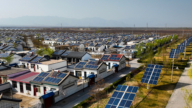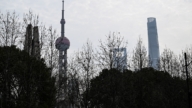【新唐人2013年09月16日讯】自今年6月份大陆银行业发生钱荒以来,有关各地银行将暂停房贷的消息层出不穷。最近,深圳4家银行公开宣布暂停房贷,中共持有的国有大行也加入了停贷的行列,在二三线城市也出现了暂停房贷的现象。有分析人士认为,这说明了大陆钱荒正在蔓延,已经蔓延到地方银行了。
《中国房地产报》9月10号报导说,深圳4家银行公开宣布暂停房贷。《重庆商报》9月9号消息也表示,由于银行信贷额度吃紧,重庆部分银行暂停受理二手房贷款﹔同一天,《中安在线》指称,合肥最近有4家银行暂停了二手房贷款,其中农行、交行、工行等国有大行也加入停贷行列。报导表示,最近几天有蔓延的趋势。
美国南卡罗莱纳大学/艾肯商学院教授谢田:“一个多月前看到的钱荒,实际上是国有的中央银行、大银行在全国的范围内的钱荒。后来,中国(共)政府不得不输入几千亿人民币暂时缓解了一下钱荒。现在看来,这个钱荒已经发生在一些地方性银行,确实钱荒正在蔓延。”
据了解,发生钱荒后,大陆有些银行就开始收紧房贷,停止二手房贷款,没有暂停二手房贷款业务的银行,利率也出现较大幅度上浮。
8月底,北京各银行房款利率优惠基本全部取消,甚至有银行在基准利率基础上上浮了20%。与此同时,大陆媒体《每日经济新闻》也发表文章表示,因为部分额度已用完,广州多家银行暂停房贷。
《新唐人》特约经济评论专家杰森分析,这次二三线城市房地产贷款放缓、停滞,是中共银行系统出于自保的措施。
《新唐人》特约经济评论专家杰森:“中共看到,它们控制房地产的措施一再失败,房地产泡沫越来越大,一线城市有一定需求,而二三线城市累积的风险越来越大,为了保全它们银行系统,控制贷款的数量,所以这是一个自保的因素。”
除了采取相应的措施外,据了解,6月份和7月份中共央行通过非公开(定向)的方式释放数千亿元流动性,这些资金在近期相继到期。
但是美国南卡罗莱纳大学/艾肯商学院教授谢田认为,中共当局的政策性调整,并没有彻底解决钱荒的问题,可能习李政府并不是真正想接胡温时代的经济包袱。李克强有意让这个钱荒爆发,把这个包袱卸掉。
近期,除了亚洲首富李嘉诚不断抛售在大陆的产业外,9月3号,美国银行悉售建设银行20亿H股,套现110多亿港元。随后,中共工、农、中、建四大国有商业银行的外资战投已全部“撤退”。
那么外资的撤退是否与中国的钱荒有关呢?
谢田:“跟外资撤离没有什么直接的关系,这个是中国国有银行内部自己的现金紧张,外资撤离是因为外资对中国经济未来不看好,是因为中国经济的下滑,萎靡下去,跟钱荒不是有直接的联系,但是肯定是互相影响。”
谢田表示,外资撤离会打击中共当局的信心,同时也打击了中国投资者的信心,也许还会催生其他一些房地产泡沫、股市泡沫的破灭。
采访/陈汉 编辑/田净 后制/王明宇
China’s Second and Third Tier Cities Cease Mortgage Loans: Are Money Shortages Worsening?
Since June this year, money shortages
have occurred in Chinese banks.
News has repeatedly indicated that banks in
certain cities had stopped mortgage services.
Recently, four banks in Shenzhen announced
they would no longer provide mortgage loans.
Several state-owned banks and banks in second
and third tier cities also made the same decision.
Analysts said that money shortages
are spreading to the local banks.
On September 10, China Real Estate Business reported
that four banks in Shenzhen stopped mortgage services.
On September 9, Chongqing Economic Times
reported that several banks in Chongqing have
stopped offering mortgages to second hand
home buyers due to tightening credit limits.
On the same day, anhuinews.com claimed
that four banks in Hefei had stopped
mortgage loan from second home buyers.
State-owned banks, including Agriculture Bank,
Bank of Communications, and Industrial &
Commercial Bank, have made the same move.
It has been reported that this
phenomenon will likely continue.
Xie Tian, Professor at the University
of South Carolina Aiken Business School:
“We saw money shortages one month ago.
In fact, it is the state-owned central banks
and major banks that were short of money.
The Chinese regime had to inject several hundred
billions Yuan to temporarily solve the problem.
Now money shortages have spread
to local banks. It is indeed spreading.”
Sources said that since the money shortages
occurred, some banks began to limit mortgage loans.
They have stopped second-hand home loan services.
If the banks hadn’t stopped second-hand loan
services, it would increased their interest rates.
At the end of August, banks in Beijing cancelled
discount deals on interest rates for mortgages.
Instead, some banks increased
20% on the standard interest rate.
China’s National Business Daily has reported that many
banks have ceased mortgage services in Guangzhou.
They have run out credit.
Jie Sen, NTD special economic commentator,
said that in second and third tier cities, mortgage
loans have slowed down and have stagnated.
It is the CCP’s measures to protect the banking system.
Jie Sen: “The CCP realized its failure
of it’s measures on real estate control.
Instead, the housing bubble has grown larger.
Properties are always demanded in first-tier cities,
yet risks in second and third tier cities are increasing.
In order to protect the banking system, they need to
control credit limits, which is a method of self-protection.”
According to ftchinese.com on September 6, China’s
Central Banks injected several hundreds billion Yuan.
This was via non-public reverse repo agreements
into the banking system in June and July.
These funds are due in the near future.
Xie Tian believes that the authorities adjusting policies
didn’t completely solve the problem of money shortages.
Maybe the new leadership does not really want to
take the economic burden from the previous regime.
Thus, Li Keqiang deliberately let the money
shortage break out, to get rid of the burden.
Recently, Li Ka-shing, Asia’s richest person,
has been pulling his property out of China.
On September 3, Bank of American sold
two billion H-shares of China Construction
Bank for over HK$11.7 billion (US$1.47 billion).
Soon, other foreign banks sold all their shares
in China’s four major state-owned banks.
Does the foreign investors’ exit from China have
a link to the Chinese banks money shortages?
Xie Tian: “The two don’t have any direct links.
It is because state-owned banks
internally are tight on cash.
Foreign investors are not optimistic about China,
and in addition, the Chinese economy is declining.
Thus, it is not directly linked with money shortages,
but both certainly have influenced each other.”
Xie Tian said that foreign investors’ leaving would
undermine the CCP’s and investors’ confidence.
It could trigger housing and stock market bubbles to burst.




























